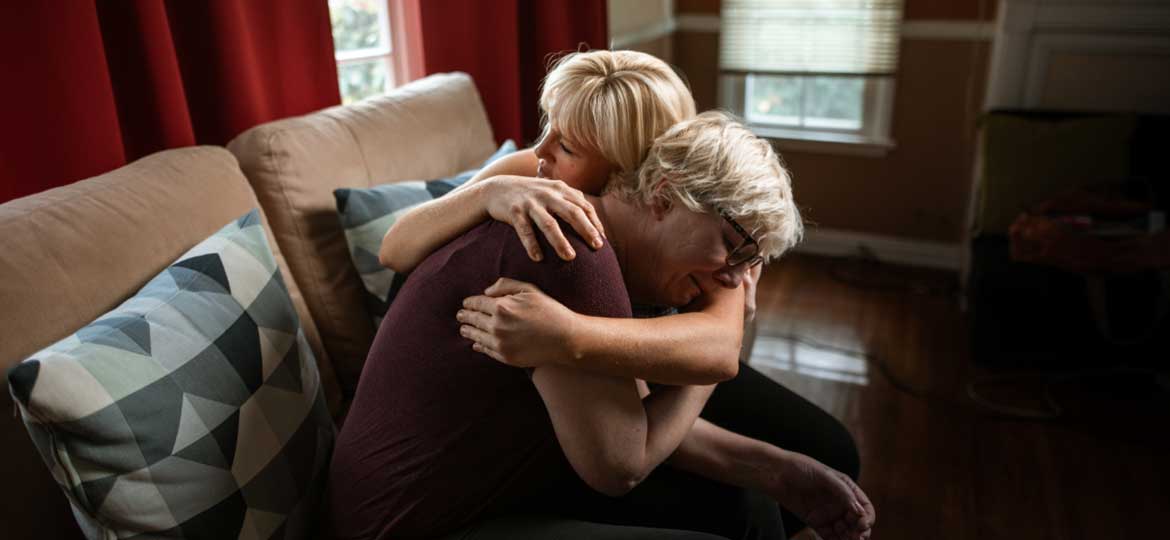Calgary Grief Counselling and Therapy: Navigating the Journey of Loss with Compassionate Support

At our Calgary Psychologist Clinic, we extend our heartfelt condolences to those experiencing grief and loss. Grief counselling offers a safe space to navigate the complex emotions that arise from losing a loved one. While the pain of loss may seem insurmountable, our experienced and compassionate therapists are here to provide support and guidance through every step of the grieving process.
Understanding Grief: Exploring the Depths of Loss
Grief is a deeply personal and multifaceted experience, encompassing a range of emotions such as sadness, anger, guilt, and profound longing. Our therapists recognize that each individual’s journey through grief is unique, shaped by the nature of the loss, the relationship with the deceased, and personal coping mechanisms. Through compassionate listening and empathetic understanding, we create a safe environment for individuals to express their emotions, share memories, and process their grief in their own time and way.
Our Calgary Psychologists Providing Grief Therapy and Bereavement Counselling
Preeti Rakhra
Registered Provisional Psychologist
English, Hindi
Dr. Raheleh Tarani
Registered Provisional Psychologist
English, Farsi, Japanese (basic), Hindi, Turkish, Punjabi, Urdu
Nav Gill
Registered Provisional Psychologist / Clinical Counsellor
English, Punjabi
Jarret Verwimp
Clinical Canadian Certified Counsellor
English, French, Spanish (basic)
Murray Molohon
Registered Psychologist
English
Andrea Krygier
Registered Psychologist
English, Spanish
Counselling Approaches: Tools for Healing and Coping
Grief counselling encompasses a variety of therapeutic approaches tailored to the needs of each individual. Our therapists draw from evidence-based techniques to support clients in navigating the complexities of grief and finding meaning in their loss. Some of the approaches we may utilize include:
Narrative Therapy:
By exploring and reframing the stories we tell ourselves about our loss, narrative therapy helps individuals find new perspectives and sources of resilience amidst grief.
Mindfulness and Meditation:
Cultivating mindfulness practices can provide a sense of grounding and presence amidst the whirlwind of emotions that accompany grief. Meditation techniques offer opportunities for reflection, self-compassion, and acceptance.
Supportive Counselling:
Our therapists offer a compassionate and non-judgmental space for clients to process their emotions, share memories, and explore their grief journey. Through active listening and empathetic understanding, we provide validation and support as individuals navigate the ups and downs of grief.
Cognitive-Behavioral Techniques:
Cognitive-behavioral therapy (CBT) tools may be employed to address maladaptive thought patterns and behaviors associated with grief, promoting healthier coping strategies and self-care practices.
Honoring Your Loved One: Celebrating Memories and Finding Meaning
While grief may feel overwhelming, it is also a testament to the depth of our love and connection with those we have lost. Our therapists work collaboratively with clients to honor the memory of their loved ones, celebrate their legacies, and find meaning in their lives moving forward. Through the process of grief counselling, individuals can find healing, resilience, and a renewed sense of purpose amidst loss.
Take the First Step Towards Healing
Embarking on the journey of grief counselling is a courageous and transformative step towards healing. We invite you to reach out and schedule a free consultation with our experienced therapists. During this initial session, you can ask questions, express your concerns, and explore how our compassionate approach to grief counselling can support you on your path to healing and restoration.
Why Grief Therapy Works: Evidence from Latest Clinical Research

Recent research reveals that 7% of bereaved individuals need specialized therapeutic help due to prolonged grief disorder. Most people naturally recover from common grief symptoms like tearfulness and insomnia. However, some people struggle with intense emotional pain that lasts longer than a year.
Grief doesn’t just cause emotional distress. Research shows it affects people in five different ways: physically, emotionally, mentally, socially, and spiritually. The pain can be so severe that it leads to serious health problems. People who are already vulnerable face a higher risk of myocardial infarction.
Specialized treatment approaches have proven their worth through clinical studies. Complicated Grief Therapy (CGT) stands out with a remarkable 51% response rate, while traditional interpersonal therapy achieves 28%. These evidence-based findings have transformed our understanding of grief treatment and helped create better ways to support people dealing with loss.
Understanding Modern Grief Therapy
Recent research shows that grief therapy needs the right timing and targeted approaches. Studies reveal that early interventions after bereavement don’t work well. The best results come when treatment starts at least six months after loss [1].
Rise of Therapeutic Approaches
The field has moved past traditional stage-based models to more flexible, customized approaches. Research reveals that psychotherapeutic interventions work moderately well if you have elevated grief levels and are seeking help [1]. Specialized treatments like Complicated Grief Therapy have shown better results, with a 51% response rate versus 28% for traditional interpersonal therapy [2].
Current Best Practices
Evidence-based practices in grief therapy highlight:
- Assessment-driven, flexibly tailored interventions
- Client-initiated treatment rather than outreach programs
- Treatment for people showing elevated distress levels
- Treatment timing of 6+ months post-loss [1]
Integration of Multiple Modalities
Today’s grief therapy combines various therapeutic traditions to handle the many aspects of loss. Modern approaches combine five key dimensions smoothly [3]:
- Physical – addresses stress regulation and simple functions
- Emotional – processes complex feelings
- Cognitive – manages thought patterns
- Social – rebuilds connections
- Spiritual – finds meaning and trust
This all-encompassing approach helps therapists create detailed treatment plans that address both loss-oriented and restoration-focused activities [1]. Cultural considerations play a vital role, and research supports adding spiritual and religious elements for specific populations [4].
These integrated approaches work especially well in treating complicated grief. Specialized interventions have shown major improvements in psychological and social functioning [1]. Modern grief therapy continues to grow and includes new evidence-based techniques while staying flexible enough to meet each client’s needs.
The Neuroscience Behind Grief Therapy
New neuroscience research shows how grief changes our brain’s structure and function. The brain notices loss as a threat to survival. This triggers physical responses that affect multiple neural systems [5].
Brain Changes During Grief
The brain goes through high stress hormone levels and different activation patterns when we grieve [6]. These changes affect several key brain regions:
- Basal Ganglia: Controls habitual patterns and relationship rewards [6]
- Nucleus Accumbens: Processes yearning and attachment [7]
- Anterior Cingulate Cortex: Manages emotional regulation [7]
- Hippocampus: Handles memory formation and retrieval [8]
How Therapy Rewires Neural Pathways
Our brain needs extensive rewiring to adapt when we lose someone we love [5]. Research shows that ongoing grief activation blocks our reward-seeking systems [5]. The good news is therapeutic interventions can help control these neural responses through emotional processing and cognitive restructuring [9].
Neuroplasticity in Grief Recovery
Knowing how to form new neural connections, called neuroplasticity, is vital in grief recovery. Studies reveal that mild to moderate stress stimulates nerve growth and lifts memory function [9]. This means well-timed therapeutic interventions can support healthy neural adaptation.
Research shows people with complicated grief display unique patterns of brain activation, particularly in areas linked to reward processing and emotional regulation [7]. Brain scans reveal higher activation in the nucleus accumbens when these individuals see photos of deceased loved ones [7]. They also show less activity in areas that control emotion regulation [7].
Therapy works by supporting the brain’s natural adaptation systems. It helps create new neural pathways that aid healthy coping strategies [5]. This biological understanding guides more targeted therapeutic approaches that look at both emotional and neurological aspects of recovery.
Clinical Evidence Supporting Grief Therapy
Clinical research strongly backs how well grief therapy works. A detailed meta-analysis shows about 10 million Americans face bereavement each year [10]. From these, 9.8% develop prolonged grief symptoms [11].
Meta-Analysis Results
Recent systematic reviews show we have a long way to go, but we can build on this progress in grief therapy outcomes. Studies with targeted interventions for clinically diagnosed grief showed moderate to large effect sizes [12]. A meta-analysis of 22 studies with 2,602 bereaved adults found that cognitive behavioral therapies produced substantial medium-term effects (g = 0.65) [13].
Randomized Control Trial Findings
Controlled trials show specialized grief interventions work better than standard approaches. A landmark study compared Complicated Grief Treatment (CGT) with standard interpersonal psychotherapy. The results showed CGT achieved better outcomes in reducing grief symptoms and improving daily functioning [14]. The research revealed:
- CGT worked better for work adjustment
- Patient’s social functioning improved substantially
- Leisure activities got a significant boost
- Home management skills showed notable growth
Long-term Outcome Studies
Long-term follow-up studies verify that grief therapy benefits last. A six-year follow-up study of the Family Bereavement Program showed lasting reduction in problematic grief symptoms [15]. The evidence points to both immediate and lasting effects from psychological interventions, especially when you have one-on-one sessions [16].
Treatment timing substantially influences outcomes. Studies show better symptom improvement in people at risk of developing persistent complex bereavement disorder. This proves counseling helps more than just waiting for time to pass [16]. Follow-up assessments show treatment gains stay stable, and many studies report that patients managed to keep their improvements at 12-month evaluations [17].
Physical Effects of Grief and Therapeutic Intervention
The physical signs of grief go beyond emotional distress and affect multiple bodily systems through complex neuroendocrine mechanisms. Research shows that bereavement triggers major physiological changes that affect both immediate and long-term health outcomes.
Physiological Impact of Loss
A loved one’s death stands among life’s most intense stressors and triggers measurable biological responses. Studies reveal that early bereavement is associated with:
- Elevated cortisol levels and altered sleep patterns [2]
- Reduced immune function and inflammatory cell changes [2]
- Increased cardiovascular risk through heightened blood pressure [2]
- Altered platelet activation and prothrombotic responses [2]
Somatic Therapy Approaches
Somatic therapy addresses trauma’s physical signs by focusing on the body’s expression of emotional pain. Clinical observations show that this approach helps release stored tension through various techniques [18]. Without doubt, its effectiveness comes from knowing how to develop bodily awareness while processing traumatic memories.
Mind-Body Connection in Recovery
The complex relationship between psychological grief and physical health needs an integrated treatment approach. Research shows that prolonged grief leads to increased inflammation [19], though these effects can be reduced through therapeutic intervention. Successful treatment programs include both psychological support and physical wellness strategies.
Clinical studies document that bereaved individuals experience elevated blood cortisol levels for at least six months after their loss [20]. Support group sessions have shown success in reducing these cortisol levels [2]. However, treatment effectiveness depends on timing and individual responsiveness.
The physical impact of grief shows up differently in each person. Some people experience acute symptoms like “broken heart syndrome,” while others face chronic health challenges [21]. Previously healthy individuals might develop new medical conditions or experience the return of dormant health issues during the grieving process [22].
The Therapeutic Alliance in Grief Work
Strong therapeutic alliance between counselor and client creates the foundation of successful grief therapy. Research shows that working alliance scores notably increase during therapy sessions. The most significant improvements happen between sessions 4 and 10 [1].
Building Trust and Rapport
Treatment outcomes in complicated grief therapy depend heavily on a positive therapeutic alliance that focuses on agreed-upon goals and tasks [23]. Studies show that early working alliance predicts success when baseline grief symptoms are controlled [1]. This original connection shapes the whole therapeutic process.
Therapist Competencies
You need these skills to be an effective grief counselor:
- Active listening and empathic understanding
- Cultural sensitivity in grief processing
- Crisis intervention capabilities
- Knowledge of grief theories and models
- Expertise in trauma-informed care
Self-efficacy and social support needs shape early working alliance formation [1]. These findings highlight how therapist readiness helps build strong therapeutic relationships.
Client-Centered Approach
Understanding and accepting a client’s experience of loss in multiple dimensions lies at the heart of the person-centered approach [24]. Therapists create a safe space through unconditional positive regard and empathic responses. Studies reveal that working alliance changes relate to reduced prolonged grief symptoms [23].
Working alliance consistently influences treatment outcomes, though the effect remains small. Correlation rates range from 0.203 to 0.275 in therapy settings of all types [1]. This evidence-based framework enables therapists to create an environment that encourages healing and growth if you have grief.
Measuring Therapeutic Success
Measuring how well grief counseling works needs systematic tools and objective monitoring. Research shows that using standard metrics to track progress helps therapists adjust their approach and get better results for their clients.
Assessment Tools and Metrics
Grief therapists use several proven tools to measure how well therapy works. The Inventory of Complicated Grief (ICG) has 19 items and shows excellent reliability with an alpha coefficient of 0.94 [25]. Here are some key assessment tools:
- Brief Grief Questionnaire (BGQ) – 5-item screening measure with scores ≥8 suggesting probable prolonged grief disorder [26]
- Texas Revised Inventory of Grief (TRIG) – 13-item questionnaire evaluates grief reactions [3]
- Bereavement Risk Assessment Tool (BRAT) – Identifies risk factors that could lead to poor outcomes [3]
Biomarkers of Grief Recovery
Scientists have found physical signs that show how people recover from grief. Research reveals lower natural killer cell activity and reduced lymphocytic response when someone first experiences loss [4]. People who lost loved ones show flatter cortisol slopes at first, but these levels return to normal as therapy helps them heal [4].
Progress Tracking Methods
Daily monitoring helps show whether therapy works. Studies reveal that 75% of people who start therapy show measurable improvements [27]. Progress tracking works best when therapists:
- Take baseline measurements
- Check emotional states regularly
- Watch for behavioral changes
- Look for functional improvements
Research shows that cognitive behavior therapy for grief makes a big difference, especially in programs that last more than 10 sessions [28]. Client satisfaction stays high with different types of therapy [29], which gives therapists quick feedback to adjust their treatment plans.
Evidence-Based Grief Therapy Techniques
Clinical research shows that structured therapy approaches work well to treat grief. Studies show that standard treatments don’t work perfectly for all patients [30]. This has led experts to develop specialized techniques.
Cognitive Behavioral Approaches
Cognitive behavioral therapy (CBT) for grief helps change unhelpful thought patterns and behaviors. Research shows CBT works through four main components:
- Teaching about grief processes
- Facing painful aspects of loss
- Restructuring thoughts
- Getting active in meaningful activities [31]
Exposure-Based Methods
Exposure therapy proves highly effective for treating prolonged grief disorder. A study of 80 patients receiving weekly two-hour group therapy sessions showed that exposure-based treatments led to better results [32]. Patients who went through exposure therapy showed bigger improvements in grief symptoms and depression. Their psychological health improved significantly among other benefits.
Integrative Therapeutic Strategies
The field now combines multiple therapy types for the best results. Trauma-focused cognitive behavioral therapy (TF-CBT) helps with both grief and trauma at the same time [33]. Therapists first look at each person’s needs to create customized treatment plans.
Research confirms that integrative approaches work through:
- Multidimensional grief therapy that helps with separation distress
- Resilient Parenting for Bereaved Families program
- Trauma and Grief Component Therapy for Adolescents
Treatment plans usually last 20-25 sessions [34]. They focus on restructuring thoughts and confrontation. Complex grief cases show good results when combining relaxation techniques, Gestalt therapy, and solution-focused methods.
Treatment of Complicated Grief Disorder
Studies show that 10-20% of people who lose a loved one develop complicated grief disorder, and they need specialized therapy [14]. These individuals face persistent, intense symptoms that substantially affect how they function in their daily lives.
Clinical Diagnostic Criteria
The diagnostic framework of complicated grief includes these key symptoms:
- Intense longing for the deceased
- Persistent preoccupation with death circumstances
- Difficulty accepting the loss
- Emotional numbness
- Identity disruption
- Avoidance of reminders
- Intense emotional pain
Evidence-Based Interventions
Complicated Grief Treatment (CGT) has become the main therapeutic approach. It runs over 16 sessions across four months [14]. This treatment combines smoothly with strategies from interpersonal psychotherapy, cognitive behavioral treatment, and motivational interviewing [14]. CGT emphasizes:
- Information provision about grief processes
- Grief monitoring through daily diaries
- Involvement of support systems
- Personal goal development
- Revisiting the death story
- Memory work and imaginal conversations
Treatment Response Patterns
Clinical trials show CGT produces better outcomes, with a 51% response rate compared to 28% for standard interpersonal therapy [35]. Therapists get a full picture to spot psychological barriers to grief progress [14]. Treatment success depends on addressing both loss-related and restoration-focused strategies.
Research shows antidepressant medications can improve treatment outcomes when combined with CGT [35]. Patients who receive combination therapy show higher response rates than those who only get psychological intervention. The treatment moves through three distinct phases: introductory sessions build alliance, intermediate sessions focus on core therapeutic work, and final sessions review and consolidate progress [35].
Stages of Grief Therapy Process
Professional grief therapy follows a well-laid-out progression through distinct therapeutic phases. Practitioners use evidence-based techniques to support clients on their path to healing throughout the treatment process.
Original Assessment Phase
The first phase of grief therapy has a detailed evaluation and client connection. Therapists establish rapport while gathering key background information about their client’s loss experience and family functioning [6]. A typical first assessment has these elements:
- Exploration of grief expectations
- Collection of coping style information
- Evaluation of emotional reactions
- Assessment of family dynamics
- Analysis of support systems
Core Treatment Period
The intermediate phase targets specific interventions. We focused on three core components of family functioning: communication, cohesiveness, and conflict [6]. Clients attend sessions every three to four weeks, with adjustments based on their needs and circumstances [6].
The treatment process encourages active participation through structured exercises and ongoing dialog. Therapists review concerns from the assessment and work to strengthen family bonds and boost coping mechanisms [6]. They evaluate progress regularly to guide therapeutic adjustments and ensure the best outcomes.
Integration and Closure
Signs of resolution lead to gradual reduction in session frequency from monthly to quarterly meetings [6]. Therapists and clients work together to develop relapse prevention strategies and maintain positive changes [6]. The integration period concentrates on:
- Identifying potential future challenges
- Developing coping mechanisms
- Creating maintenance strategies
- Establishing support networks
A structured termination phase concludes the therapeutic process. This helps clients process their progress and prepare for continued growth. Therapists help people recognize their resilience while acknowledging that grief often needs ongoing attention and care [36].
Effective Bereavement Counseling Techniques
Bereavement counseling techniques now include proven methods that help people process emotions and rebuild meaning in their lives. Studies show narrative therapy works particularly well to help people work through their experiences of loss.
Narrative Therapy Methods
A 12-16 session program of narrative reconstruction therapy helps people make sense of their loss experiences [37]. Clients work on these aspects:
- Building back their memories systematically
- Connecting with their life experiences
- Finding personal meaning
- Working through emotional aspects
Emotional Processing Tools
Studies confirm that expressive writing helps people process grief effectively, especially when they focus on finding meaning [38]. Writing therapy comes in many forms. People can write about their life stories or participate in meaning reconstruction interviews that help them process vivid memories of their loss [38].
Meaning-Making Strategies
Meaning-Centered Grief Therapy (MCGT) has achieved a soaring win in helping parents find meaning and deal with grief symptoms [5]. This approach works with three key elements:
- Ways to face emotional pain
- Methods to honor loved ones
- Building lasting connections
Studies show that finding benefits – a way of making meaning – involves seeing positive outcomes from loss experiences [5]. Parents who grieve tend to show fewer symptoms of grief through this process [5]. Therapists encourage people to stay connected with meaningful activities like work, hobbies, and relationships [5].
Clinical research shows that as people find more meaning in different ways, their prolonged grief symptoms often decrease [5]. Therapists look at several ‘clinical entry points’ to help improve the meaning-making process [5]. This well-laid-out approach helps people understand their loss while keeping their sense of who they are and their purpose in life.
Cultural Considerations in Grief Therapy
Cultural nuances in grief expression lay the groundwork for therapeutic interventions that work. Studies show that treatment outcomes improve substantially after therapists integrate cultural assessment tools into standard grief therapy protocols [39].
Cultural Competency
Grief therapists need detailed cultural assessment skills. The therapeutic process helps them assess:
- Cultural traditions related to death and mourning
- Religious and spiritual beliefs about loss
- Family’s hierarchy and decision-making patterns
- Expression of emotions within cultural contexts
- Help-seeking behaviors and priorities
Diverse Grieving Patterns
Studies across cultures show distinct variations in how people express grief and how long they grieve. Research has found that Egyptian culture sees grief lasting up to seven years as normal. Western clinical guidelines, however, often pathologize grief that continues beyond 12 months [40]. These differences extend to mourning practices naturally. Some cultures put emphasis on collective grief while others focus on individual processing [39].
Adaptive Treatment Approaches
Grief therapy must be tailored based on cultural factors. Clinical evidence supports five key strategies to adapt treatment:
- Integration of cultural brokers and experts
- Modification of treatment duration and frequency
- Incorporation of traditional healing practices
- Adjustment of therapeutic communication styles
- Recognition of cultural mourning rituals
Studies show that culturally adapted interventions lead to better outcomes [41]. The core team must stay flexible in their approach since cultural identities often connect with individual priorities and experiences [42].
Assessment tools with cultural supplements have shown promising results. They help identify grief symptoms more sensitively in a variety of populations [39]. Modern grief therapy now emphasizes cultural competency training and ongoing cultural assessment throughout the therapeutic journey.
Special Populations and Considerations
Clinical research shows different populations need specific therapeutic approaches in grief counseling. Studies reveal that traumatic loss often involves potentially traumatic circumstances and ranks among the most reported traumatic events [9].
Child and Adolescent Grief
Young people handle grief differently than adults and need age-specific interventions. Research has verified several approaches that work well:
- Trauma-focused cognitive behavioral therapy
- Multidimensional grief therapy
- Resilient Parenting for Bereaved Families program
- Grief and Trauma Intervention for ages 7-12
Children who took part in the Family Bereavement Program experienced fewer prolonged grief symptoms and suicidal thoughts even 15 years after treatment [33].
Elderly Bereavement
Older adults face unique challenges with loss. Research points to higher death risks during the first three months after losing a spouse [43]. Elderly people often struggle with several challenges during grief:
- Changes in independence levels
- Loss of long-term companionship
- Multiple concurrent losses
- Health complications
Traumatic Loss Treatment
Traumatic loss needs specialized therapy approaches because it often causes disturbed grief along with posttraumatic stress disorder and depression [9]. Clinical studies show positive results from Eye Movement Desensitization and Reprocessing (EMDR) and Cognitive Behavioral Therapy [9].
Higher baseline levels of self-blame and avoidance can predict how well treatment works [9]. Many people show resilience when facing traumatic loss. Specialized treatments focus on:
- Processing traumatic memories
- Managing complicated grief symptoms
- Addressing concurrent PTSD
- Developing coping mechanisms
Practitioners should note that people with intellectual and developmental disabilities face unique challenges when processing loss [44]. Research shows that sheltering people from loss-related experiences usually creates bigger problems later [45].
Future Directions in Clinical Research
Clinical research has revealed new approaches to grief therapy, and technology-based interventions have become viable alternatives that provide support. Virtual support groups and online counseling proved effective during and after the pandemic [7].
Emerging Treatment Modalities
Technology has expanded grief therapy services significantly. Research shows online memorials help people maintain connections with the deceased better than traditional memorials [7]. Virtual support groups have also shown great success in helping bereaved individuals immediately.
Research Priorities
Research teams now focus on filling critical gaps in grief intervention knowledge. The key areas under investigation include:
- Professional development and training needs [8]
- Integration of complicated grief research into practice [8]
- Assessment of treatment competency levels [8]
- Development of empirically supported training programs [8]
Studies reveal this is a big deal as it means that professionals’ confidence in treating complicated grief exceeds their actual competence [8]. Research indicates professional practice and current research findings don’t line up properly [8].
Promising Clinical Trials
Groundbreaking clinical trials now examine novel therapeutic approaches. The research teams focus on:
Naltrexone for Prolonged Grief Disorder
Psychedelic-Assisted Therapy
The field evolves with new transitional bereavement care models [46]. Healthcare systems need sustained financial investments and cultural changes for implementation [46]. Research shows coordinated public health efforts backed by multilevel resource investments help prevent damaging effects of interpersonal losses [46].
Leading institutions and countries’ analysis helps academics find potential collaborators in grief intervention research [7]. Over the last several years, themes like COVID-19, grief among workers, and disenfranchised grief have gained attention [7]. These developments indicate a research focus change to address modern challenges in grief therapy and support.
Conclusion
Science has confirmed grief therapy’s vital role in helping people cope with loss. Clinical evidence shows specialized methods like Complicated Grief Therapy work better than traditional approaches.
Grief shows up differently across cultures and groups of people. Success in therapy comes from using proven methods that fit each person’s needs. These methods look at everything – from physical and emotional to cognitive, social, and spiritual aspects. They also take into account the deep brain changes that happen when someone grieves.
New technology and innovative treatments have reshaped the scene of grief therapy. Clinical trials that look into drug treatments and psychedelic-assisted therapy show hope for people with prolonged grief disorder. On top of that, cultural understanding is vital as therapists create better ways to help people from different backgrounds.
This field keeps growing, backed by thorough research and careful study of how well treatments work. So, grief therapy stands as a scientifically proven way to help people direct their path through loss while they stay healthy and build inner strength.
FAQs
Q1. How effective is grief therapy according to recent research?
Recent clinical studies demonstrate that specialized grief therapy approaches, such as Complicated Grief Therapy (CGT), show significant effectiveness. CGT has a 51% response rate compared to 28% for traditional interpersonal therapy, indicating its superior outcomes in reducing grief symptoms and improving daily functioning.
Q2. What are some evidence-based techniques used in grief therapy?
Evidence-based grief therapy techniques include cognitive behavioral approaches, exposure-based methods, and integrative strategies. These involve psychoeducation, exposure to painful aspects of loss, cognitive restructuring, and behavioral activation. Specialized treatments like Complicated Grief Treatment (CGT) combine elements from various therapeutic traditions to address the multidimensional nature of grief.
Q3. How does grief affect the brain, and how does therapy help?
Grief causes measurable changes in brain structure and function, affecting regions like the basal ganglia, nucleus accumbens, and anterior cingulate cortex. Grief therapy helps rewire neural pathways by supporting the brain’s natural adaptation mechanisms. Through structured interventions, it creates new neural connections that facilitate healthy coping strategies and emotional regulation.
Q4. Are there physical effects of grief, and how does therapy address them?
Yes, grief can have significant physical effects, including elevated cortisol levels, reduced immune function, and increased cardiovascular risk. Grief therapy addresses these issues through somatic approaches and mind-body connection techniques. Treatment programs often incorporate both psychological support and physical wellness strategies to mitigate the physiological impact of grief.
Q5. How important is cultural competency in grief therapy?
Cultural competency is crucial in grief therapy as cultural factors significantly influence grief expression and processing. Effective therapists assess cultural traditions, religious beliefs, and family dynamics to tailor their approach. Research shows that culturally adapted interventions yield superior outcomes, emphasizing the importance of integrating cultural considerations throughout the therapeutic process.
References
[1] – https://link.springer.com/article/10.1007/s10608-023-10383-8
[2] – https://pmc.ncbi.nlm.nih.gov/articles/PMC3384441/
[3] – https://www.icanotes.com/2024/07/25/assessing-grief-and-treating-grief/
[4] – https://pmc.ncbi.nlm.nih.gov/articles/PMC3384442/
[5] – https://pmc.ncbi.nlm.nih.gov/articles/PMC4361184/
[6] – https://pmc.ncbi.nlm.nih.gov/articles/PMC6075836/
[7] – https://pmc.ncbi.nlm.nih.gov/articles/PMC10442158/
[8] – https://www.sciencedirect.com/science/article/pii/S0738399121006236
[9] – https://pmc.ncbi.nlm.nih.gov/articles/PMC7593703/
[10] – https://onlinelibrary.wiley.com/doi/full/10.1002/da.22965
[11] – https://pmc.ncbi.nlm.nih.gov/articles/PMC7848251/
[12] – https://trialsjournal.biomedcentral.com/articles/10.1186/s13063-018-2618-3
[13] – https://pure.johnshopkins.edu/en/publications/narrative-review-of-the-potential-for-psychedelics-to-treat-prolo
[14] – https://pmc.ncbi.nlm.nih.gov/articles/PMC3156458/
[15] – https://pmc.ncbi.nlm.nih.gov/articles/PMC2874830/
[16] – https://www.frontiersin.org/journals/psychiatry/articles/10.3389/fpsyt.2022.1047448/full
[17] – https://www.tandfonline.com/doi/full/10.1080/20008198.2021.1926650
[18] – https://www.health.harvard.edu/blog/what-is-somatic-therapy-202307072951
[19] – https://bereavementcenter.org/project/grief-and-the-mind-body-connection/
[20] – https://www.rememberingalife.com/blogs/blog/the-physiology-of-grief
[21] – https://www.ncbi.nlm.nih.gov/books/NBK507832/
[22] – https://www.webmd.com/balance/special-reports/grief-stages/20190711/how-grief-affects-your-body-and-mind
[23] – https://www.researchgate.net/publication/325723682_Therapeutic_Alliance_and_Outcome_in_Complicated_Grief_Treatment
[24] – https://uk.sagepub.com/sites/default/files/upm-assets/44002_book_item_44002.pdf
[25] – https://www.apa.org/pi/about/publications/caregivers/practice-settings/assessment/tools/complicated-grief
[26] – https://psychiatryonline.org/doi/full/10.1176/appi.focus.20200052
[27] – https://www.sondermind.com/resources/articles-and-content/why-tracking-your-therapy-progress-matters-and-how-to-do-it/
[28] – https://www.sciencedirect.com/science/article/pii/S0165032723006663
[29] – https://pmc.ncbi.nlm.nih.gov/articles/PMC8701663/
[30] – https://www.sciencedirect.com/science/article/pii/S1077722923000937
[31] – https://www.jber.jb.mil/Portals/144/Services-Resources/Resiliency-Resources/PDF/SelfCareTipSheets/Grief.pdf
[32] – https://www.reuters.com/article/business/healthcare-pharmaceuticals/exposure-therapy-helps-patients-with-prolonged-grief-idUSKCN0IC2AN/
[33] – https://www.apa.org/monitor/2022/10/evidence-based-practices-grief
[34] – https://www.tandfonline.com/doi/full/10.3402/ejpt.v2i0.7995
[35] – https://pmc.ncbi.nlm.nih.gov/articles/PMC3384444/
[36] – https://whatsyourgrief.com/what-does-it-mean-to-integrate-grief/
[37] – https://pmc.ncbi.nlm.nih.gov/articles/PMC4858499/
[38] – http://hospicewhispers.com/wp-content/uploads/2016/11/NiemeyerGriefTheory.pdf
[39] – https://pmc.ncbi.nlm.nih.gov/articles/PMC10103155/
[40] – https://theconversation.com/death-and-dying-how-different-cultures-deal-with-grief-and-mourning-197299
[41] – https://doaj.org/article/c6b916ce062c4ac0af082a1e95b6cc70
[42] – https://psychiatryonline.org/doi/10.1176/appi.ps.201700422
[43] – https://www.ioaging.org/end-of-life/how-grief-counseling-can-help-older-adults-after-the-loss-of-a-spouse-or-partner/
[44] – https://iod.unh.edu/integrated-mental-health-treatment-guidelines-prescribers-intellectual-developmental-disabilities/view-guidelines-online/best-practices-mh-diagnosis-treatment/grief-loss
[45] – https://www.intellectualdisability.info/mental-health/articles/managing-grief-better-people-with-intellectual-disabilities
[46] – https://www.thelancet.com/journals/lanpub/article/PIIS2468-2667(24)00030-6/fulltext
Calgary Counselling And Psychologist Services
Our Calgary Psychologists and therapists offer counselling and formal psychological assessment services for individuals, couples, and families. We tailor these services to meet the unique needs of each client. Our goal is to support our clients in achieving their personal and relational goals.
We help families improve communication and solve problems. We also offer assessments for learning disabilities and ADHD. Our support extends to various mental health issues. Our support covers many mental health issues.
Our therapists dedicate themselves to providing a safe and supportive environment for clients of all ages and backgrounds. They help clients explore their thoughts, feelings, and experiences. The team is committed to creating a space where clients can feel comfortable and understood. They strive to help clients on their journey towards healing and growth.
We are here to help with individual therapy, couples counseling, or support for your child, teen or family. We offer counseling services in person and virtually. This makes it convenient and flexible for our clients to access our services. Whatever challenges you may be facing, we are committed to guiding you towards healing, growth, and greater well-being.

























Calgary Therapy Mental Health Issues
In our Calgary counselling clinic, we help with many mental health problems. Our therapists can assist with a range of issues. These include grief, trauma, anxiety, depression, parenting challenges, PTSD, eating disorders, postpartum depression, fears and phobias, ADHD, self-esteem issues, relationship difficulties, OCD and many more.
No matter what you’re dealing with, our therapists are here to provide evidence-based therapy that fits your needs. We want to help you overcome challenges, build resilience, and find more happiness and fulfillment in your life.



























